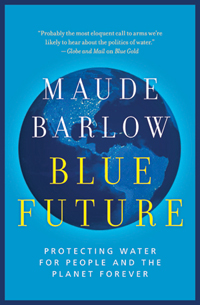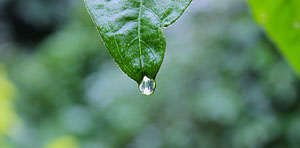September 24, 2018
Mercy Day
And what does all of this mean in terms of a more merciful and survivable world?
 Maude Barlow, Chair of the Council of Canadians and renowned water and human rights activist lays out the vision for a new approach to the future of water—and ourselves—in her seminal work, Blue Future: Protecting Water for People and Planet
Maude Barlow, Chair of the Council of Canadians and renowned water and human rights activist lays out the vision for a new approach to the future of water—and ourselves—in her seminal work, Blue Future: Protecting Water for People and Planet
Barlow convincingly argues that, if water will in fact exist in the future, we must believe and act on the present reality that:
1. Water is a human right and must be shared more equitably.
2. Water is a common heritage of future generations and must be protected as a public trust in law and practice.
3. Water has rights too, outside of its usefulness to humans.
4. Water can teach us how to live together if we will only let it.
This means embracing a new water ethic—a different approach to our moral obligation to preserve this irreplaceable, life-giving gift.
In a must-read blog posting on these principles, , we encourage you to consider the profound implications of this new water ethic for the way we live and share Mercy in our world. Equally important is how we advocate for the future of our planet.
Mercy Global Action
The Sisters of Mercy worldwide and Mercy International Association at the UN are giving voice nationally and internationally at the UN to this urgent call as we advocate for the place of water in the creation of Sustainable Development Goals and the Post-2015 Development Agenda.
MIA members in every country are raising concerns about putting a price on water and the poisoning of water by extractive industry abuses, especially through mining and the threat posed by hydraulic fracturing. During the past year, Mercy E-News has consistently reported on the advocacy actions of members and colleagues to speak the truth to local and national power on the peril of neglecting the assault on water.
During the recent UN President of the General Assembly (PGA) Debate on Water Sanitation and Sustainable Energy, the Mining Working Group (MWG), of which MIA at the UN is an active member, affirmed that 'Water is not a commodity: water is life; water is a right.' The MWG further warned that commodification of water is the primary obstacle to guaranteeing the right to water for present and future generations. To the MWG member organizations, water is an indispensable component of the global commons—that mutual space of earth that we all share. The MWG expressed its deep concern about the future sustainability of water for life – life for all peoples now, for future generations, and for the planet itself. Grounded in human-rights law and the experience of our members, the MWG reflected the perspective of the independent expert on human rights and the environment John Knox, who urges that a healthy environment – which itself holds inherent rights to the water it needs for survival – is essential to achieving those human rights.
The Mining Working Group statement outlined the following as essential elements in a vision for the Sustainable Development Goals:
1. Recognition of water as integral to the global commons, as a most basic human right.
2. A transformational shift from a paradigm of commodification and privatization of water to a human rights-based approach, rooted in inter-generational equity and the future sustainability of our planet.
3. Priorities for the use of water focused on human consumption, food production, watershed protection, care of vital ecosystems, and provision for future generations – rather than on industrial consumption and the commodification of water.
4. Preservation of the integrity of the water cycle and the recognition of the rights of ecosystems and species to exist, thrive, evolve and reproduce.
5. A focus on root causes of global water and sanitation concerns, including inequitable use, overconsumption, contamination and sustainability.
6. Acknowledgement in the design of the development agenda that policies related to extractive industries are necessarily decisions on water.
7. A global study, including data collection and technical and transparent analysis, of the cumulative impact of extractive activities on public health, vital water resources, and their dependent ecosystems.
8. A total moratorium on oil, gas and mining activities that threaten water quality, water source and the sustainability of water.
9. Development of alternative economies that do not rely on over-extraction and contamination of water.
10. The voice of affected local communities, who are often marginalized and impoverished, is integral and must be included in the agenda.
11. A guarantee that civil and political rights related to water management at the local and national level, in accordance with international human-rights and environmental law, are a means to achieve effective, democratic, and sustainable policies.
Opportunities and Challenges of a New Water Ethic

Finally, Maude Barlow’s new book: Blue Future: Blue Future: Protecting Water for People and Planet is an excellent resource for prayer, study, reflection and advocacy on water. We encourage you to read it in community circles and use her four-point new global water ethic. Water can teach us—if we will only let it—how to live together on this blue marble Earth.
Messages to:
Denise Boyle fmdm - Assistant Director Mercy Global Action
Áine O’Connor rsm - Mercy Global Action Co-ordinator at the UN
Image: Drop of Water. Shyamanta Baruah. Used under CCO